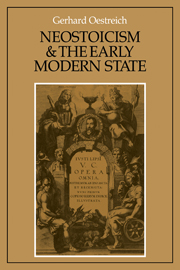Book contents
- Frontmatter
- Contents
- Foreword
- Introduction
- PART I JUSTUS LIPSIUS AND THE NETHERLANDS MOVEMENT
- PART II THE CONSTITUTIONAL DEVELOPMENT OF THE EARLY MODERN STATE
- 8 The religious covenant and the social contract
- 9 ‘Police’ and Prudentia civilis in the seventeenth century
- 10 From contractual monarchy to constitutionalism
- 11 The estates of Germany and the formation of the state
- 12 The constitutional situation of monarchy in Germany from the sixteenth to the eighteenth century
- 13 Army organization in the German territories from 1500 to 1800
- 14 The constitution of the Holy Roman Empire and the European state system 1648–1789
- 15 The structure of the absolute state
- Index
14 - The constitution of the Holy Roman Empire and the European state system 1648–1789
Published online by Cambridge University Press: 04 May 2010
- Frontmatter
- Contents
- Foreword
- Introduction
- PART I JUSTUS LIPSIUS AND THE NETHERLANDS MOVEMENT
- PART II THE CONSTITUTIONAL DEVELOPMENT OF THE EARLY MODERN STATE
- 8 The religious covenant and the social contract
- 9 ‘Police’ and Prudentia civilis in the seventeenth century
- 10 From contractual monarchy to constitutionalism
- 11 The estates of Germany and the formation of the state
- 12 The constitutional situation of monarchy in Germany from the sixteenth to the eighteenth century
- 13 Army organization in the German territories from 1500 to 1800
- 14 The constitution of the Holy Roman Empire and the European state system 1648–1789
- 15 The structure of the absolute state
- Index
Summary
The problem of German unity from the Peace of Westphalia to the French Revolution, as it affected both internal and external politics, is characterized by ‘German liberty’ and Austro-Prussian dualism. For the two great developments of the period are the expansion of Austria-Hungary as a great power beyond the Empire and the rise of Brandenburg-Prussia above the condition of a mere imperial territory. These two became independent European powers and took their place within the international system of the balance of power. The creation of new states in the south-east and the north-east had direct consequences for the constitution and political order of the Empire. To an even greater extent than before, German disunity became a European problem, and the scope for foreign interference, by no means diminished, took on a new character.
The idea of ‘German freedom’, of the liberty of the imperial estates, was invoked again and again until the Holy Roman Empire came to an end. It was a fundamental principle of German life – in the first place a constitutional principle which safeguarded the jus statuum, the privileges and prerogatives enjoyed by the electors, princes, counts, and towns vis-à-vis the Emperor. These privileges and prerogatives dated from medieval times and were consolidated during the period of imperial reform around the beginning of the sixteenth century. The idea of German freedom was not confined to the legal sphere, but affected the general sentiment of the age and was deeply lodged in German consciousness.
- Type
- Chapter
- Information
- Neostoicism and the Early Modern State , pp. 241 - 257Publisher: Cambridge University PressPrint publication year: 1982



